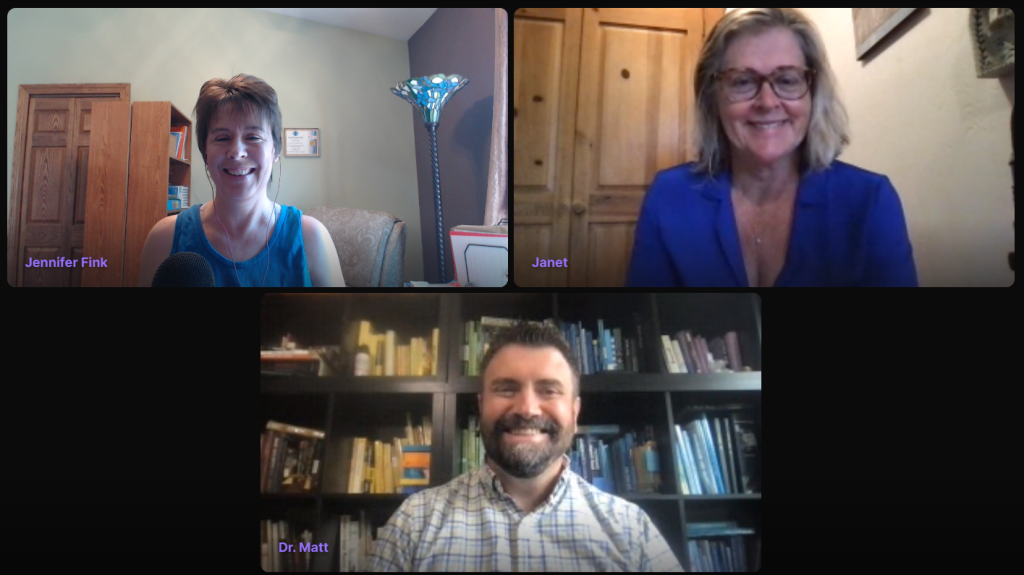Player FM uygulamasıyla çevrimdışı Player FM !
Understanding & Supporting Neurodivergent Boys
Manage episode 433037495 series 2125047
How do we best support neurodivergent boys?
Approximately 12% of boys in the United States have been diagnosed with ADHD. About 3% are on the autism spectrum. 18% of boys have dyslexia. An untold number are gifted – &, of course, many boys are 2e, or twice-exceptional, with more than one of these conditions.
Dr. Matt Zakreski was one of those boys. “My backpack always looked like a bomb went off, I always forgot there were tests but could study 3 minutes before the test and get a 92,” says Dr. Matt, author of Neurodiversity Playbook: How Neurodivergent People Can Crack the Code of Living in a Neurotypical World.His obvious-in-hindsight ADHD wasn’t noticed or address until he was in high school.
Neurodiversity affects the intellectual, social, and emotional development of neurodivergent boys.”You have have a 10 year-old who’s intellectually 15 but socially, they’re 8,” Dr. Matt says, noting that neurodivergent boys need support both where they’re “ahead” of their similarly aged peesr and where they’re “behind.”
Living with & Supporting Neurodivergent Boys
“Be curious, not furious,” Dr. Matt advises. Instead of getting mad when your child does (or doesn’t do!) something, get curious. Don’t assume that the child is being defiant, disobedient, or trying to annoy you. Remind yourself, “this child has needs that I don’t necessarily understand right now.” Take some deep breaths or do whatever else you need to do to calm yourself first. Then, get curious: ask your child what’s going on. Listen carefully. You’ll likely learn more about your child & strengthen your relationship.
Parenting neurodivergent kids will also include helping kids learn how to manage their attraction to things that feel good in the moment but may be harmful in excess. (Think: screens). Compromise — and demonstrating understanding & empathy for your kid’s interests and goals — can help.
Neurodivergent-friendly environments are crucial for the success and well-being of neurodivergent children. You are not impairing their ability to cope or function in the broader world by considering your son’s unique needs.
“Resiliency is not just working harder,” Dr. Matt says. “You build resiliency fastest and most generalizable through the things you like to do the most.” Giving boys plenty of opportunities to pursue the activities and problems that interest them also gives them opportunities to develop intellectually, socially, and emotionally.
Takeaways:
- Neurodivergent individuals have unique brains that develop asynchronously, with strengths in certain areas and challenges in others
- Understanding and supporting neurodivergent children requires looking beyond academics and considering their social, emotional, and developmental needs
- Parenting neurodivergent children involves being curious, not furious, and finding compromises that meet both the child’s needs and the parent’s boundaries
- Setting reasonable limits on screen time and using a third-door solution approach can help navigate conflicts around technology use
- Psychoeducation, explaining how a child’s brain works and why certain behaviors occur, can empower children and reduce self-blame. Neurodivergent boys often struggle with self-regulation and may exhibit behaviors that are coping strategies
- Providing neurodivergent boys with a customized playbook of coping strategies can help them manage their emotions and impulses
- Neurodivergent-friendly environments, such as schools and activities, are crucial for the success and well-being of neurodivergent boys
- It is important to fight against gender stereotypes and embrace the
- unique strengths and interests of neurodivergent boys
Links we mentioned (or should have) in this episode:
Neurodiversity Playbook: How Neurodivergent People Can Crack the Code of Living in a Neurotypical World, by Dr. Matt Zakreski
Building Boys: Raising Great Guys in a World That Misunderstands Males, by Jen
Sponsor Spotlight: ByHeart
Get 10% off your first order using code ONBOYS at byheart.com
Sponsor Spotlight: Lumen
Understand your metabolism! Go to lumen.me/ONBOYS to save 15% on Lumen
Sponsor Spotlight: Armoire
Clothing rental subscription that makes getting dressed easier. Visit armoire.style/ONBOYS to get up to 50% OFF your first month.
Jen in one of her favorite Armoire rentals
Our Sponsors:
* Check out Armoire: armoire.style/ONBOYS
* Check out Artifact Uprising and use my code ONBOYS for a great deal: www.artifactuprising.com
* Check out ByHeart and use my code ONBOYS for a great deal: byheart.com
* Check out Lumen: lumen.me/ONBOYS
Advertising Inquiries: https://redcircle.com/brands
Privacy & Opt-Out: https://redcircle.com/privacy
342 bölüm
Manage episode 433037495 series 2125047
How do we best support neurodivergent boys?
Approximately 12% of boys in the United States have been diagnosed with ADHD. About 3% are on the autism spectrum. 18% of boys have dyslexia. An untold number are gifted – &, of course, many boys are 2e, or twice-exceptional, with more than one of these conditions.
Dr. Matt Zakreski was one of those boys. “My backpack always looked like a bomb went off, I always forgot there were tests but could study 3 minutes before the test and get a 92,” says Dr. Matt, author of Neurodiversity Playbook: How Neurodivergent People Can Crack the Code of Living in a Neurotypical World.His obvious-in-hindsight ADHD wasn’t noticed or address until he was in high school.
Neurodiversity affects the intellectual, social, and emotional development of neurodivergent boys.”You have have a 10 year-old who’s intellectually 15 but socially, they’re 8,” Dr. Matt says, noting that neurodivergent boys need support both where they’re “ahead” of their similarly aged peesr and where they’re “behind.”
Living with & Supporting Neurodivergent Boys
“Be curious, not furious,” Dr. Matt advises. Instead of getting mad when your child does (or doesn’t do!) something, get curious. Don’t assume that the child is being defiant, disobedient, or trying to annoy you. Remind yourself, “this child has needs that I don’t necessarily understand right now.” Take some deep breaths or do whatever else you need to do to calm yourself first. Then, get curious: ask your child what’s going on. Listen carefully. You’ll likely learn more about your child & strengthen your relationship.
Parenting neurodivergent kids will also include helping kids learn how to manage their attraction to things that feel good in the moment but may be harmful in excess. (Think: screens). Compromise — and demonstrating understanding & empathy for your kid’s interests and goals — can help.
Neurodivergent-friendly environments are crucial for the success and well-being of neurodivergent children. You are not impairing their ability to cope or function in the broader world by considering your son’s unique needs.
“Resiliency is not just working harder,” Dr. Matt says. “You build resiliency fastest and most generalizable through the things you like to do the most.” Giving boys plenty of opportunities to pursue the activities and problems that interest them also gives them opportunities to develop intellectually, socially, and emotionally.
Takeaways:
- Neurodivergent individuals have unique brains that develop asynchronously, with strengths in certain areas and challenges in others
- Understanding and supporting neurodivergent children requires looking beyond academics and considering their social, emotional, and developmental needs
- Parenting neurodivergent children involves being curious, not furious, and finding compromises that meet both the child’s needs and the parent’s boundaries
- Setting reasonable limits on screen time and using a third-door solution approach can help navigate conflicts around technology use
- Psychoeducation, explaining how a child’s brain works and why certain behaviors occur, can empower children and reduce self-blame. Neurodivergent boys often struggle with self-regulation and may exhibit behaviors that are coping strategies
- Providing neurodivergent boys with a customized playbook of coping strategies can help them manage their emotions and impulses
- Neurodivergent-friendly environments, such as schools and activities, are crucial for the success and well-being of neurodivergent boys
- It is important to fight against gender stereotypes and embrace the
- unique strengths and interests of neurodivergent boys
Links we mentioned (or should have) in this episode:
Neurodiversity Playbook: How Neurodivergent People Can Crack the Code of Living in a Neurotypical World, by Dr. Matt Zakreski
Building Boys: Raising Great Guys in a World That Misunderstands Males, by Jen
Sponsor Spotlight: ByHeart
Get 10% off your first order using code ONBOYS at byheart.com
Sponsor Spotlight: Lumen
Understand your metabolism! Go to lumen.me/ONBOYS to save 15% on Lumen
Sponsor Spotlight: Armoire
Clothing rental subscription that makes getting dressed easier. Visit armoire.style/ONBOYS to get up to 50% OFF your first month.
Jen in one of her favorite Armoire rentals
Our Sponsors:
* Check out Armoire: armoire.style/ONBOYS
* Check out Artifact Uprising and use my code ONBOYS for a great deal: www.artifactuprising.com
* Check out ByHeart and use my code ONBOYS for a great deal: byheart.com
* Check out Lumen: lumen.me/ONBOYS
Advertising Inquiries: https://redcircle.com/brands
Privacy & Opt-Out: https://redcircle.com/privacy
342 bölüm
Alle episoder
×Player FM'e Hoş Geldiniz!
Player FM şu anda sizin için internetteki yüksek kalitedeki podcast'leri arıyor. En iyi podcast uygulaması ve Android, iPhone ve internet üzerinde çalışıyor. Aboneliklerinizi cihazlar arasında eş zamanlamak için üye olun.









